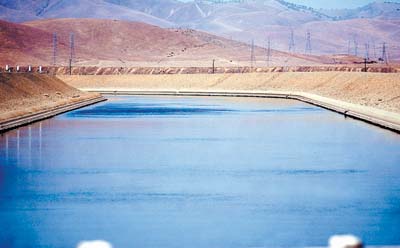
San Benito County Farm Bureau President Gregg Swett reiterated a
state organization’s plea against a possible shutting off of
federal water supplies to California and called the potential
action
”
devastating
”
to this area.
HOLLISTER
San Benito County Farm Bureau President Greg Swett reiterated a state organization’s plea against a possible shutting off of federal water supplies to California and called the potential action “devastating” to this area.
U.S. Bureau of Reclamation officials said Friday parched reservoirs and patchy snow and rainfall this year would likely force them to slash surface water deliveries down to zero. This would be the first time in more than 15 years such a move was taken.
The state farm bureau responded today by calling for “immediate action” to deter the zero supply possibility. The group’s president said the State Water Resources Control Board should assure that voluntary, short-term water sales and transfers proceed quickly, and keep review of proposed transfers as a top priority.
Swett, who agreed with the state group’s message, reacted by noting how San Benito County generally needs about 16,000 acre-feet of water annually – an acre foot amounts to 325,000 gallons – and how the remaining 20,000 acre-feet are pulled from local wells.
The extra kicker is that the federal supply, or blue-valve water, is of much higher quality and contains significantly less salt content. That means local farmers might be restricted to well supplies that are lower in quality as a whole.
“The importance of that is, when you’re growing leafy greens, salts are a detriment,” said Swett, of Paicines. “Better water allows much better production. People will have to put up with lesser quality and lesser quantity.”
Swett noted optimistically how there had been an unusually wet March about nine years ago that balanced out a previously dry season.
“It’s imperative that everybody pray for rain,” he said.
He pointed out how the water shortage is a combination of nature – with drought conditions – and man-made as well due to federal litigation surrounding protections for the Delta smelt, a threatened species whose population has dropped in recent years.
The debate revolves around whether the two-inch-long fish species’ population has dropped due to delta pumping or another cause such as ammonia being released by nearby wastewater treatment plants in that area.
Swett also pointed to the state’s inability to build infrastructure matching California’s rapid growth in the past two to three decades.
“The state essentially hasn’t built or done anything with water resources in a long time,” he said.








